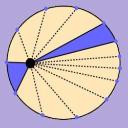Yahoo Answers is shutting down on May 4th, 2021 (Eastern Time) and beginning April 20th, 2021 (Eastern Time) the Yahoo Answers website will be in read-only mode. There will be no changes to other Yahoo properties or services, or your Yahoo account. You can find more information about the Yahoo Answers shutdown and how to download your data on this help page.
Trending News
Q1 a) Prove that the sum of the squares of the first n integers is 1/24 (2n) (2n+1) (2n+2)?
(b): Explain whether for a prime p >= 5, p2 + 2 is composite or not
2 Answers
- KeplJoeyLv 71 decade agoFavorite Answer
a/. Let's prove this using induction. First show it to be true for n=1. The sum of the first 1 integer squared is 1² = 1. Substituting n = 1 into
1/24(2n)(2n+1)(2n+2) gives 1/24(2)(3)(4), which is indeed equal to 24/24 = 1.
Now assume it is true for n=k. In other words, you need to assume the sum of the squares of the first k integers is 1/24(2k)(2k+1)(2k+2). You need to use this assumption to show it is also true for n=k+1.
The sum of the squares of the first k+1 integers is equal to the sum of the first k integers plus (k+1)².
So it is equal to
[1/24 (2k)(2k+1)(2k+2)] + (k+1)²
= [1/24 (2k)(2k+1)(2k+2)] + k² + 2k + 1
= [1/24 (2k)(2k+1)(2k+2)] + 24(k² + 2k + 1)/24
= [(2k)(2k+1)(2k+2) + 24(k²+2k+1)]/24
Expand out the (2k)(2k+1)(2k+2) part to get (4k²+2k)(2k+2) = 8k³+8k²+4k²+4k = 8k³+12k²+4k . So we have
= [(2k)(2k+1)(2k+2) + 24(k²+2k+1)]/24
= [8k³+12k²+4k + 24(k²+2k+1)]/24
= [8k³+12k²+4k + 24k²+48k+24)]/24
= [8k³+36k²+52k+24]/24
This is the sum of the squares of the first k+1 integers. We want to show this is equal to
1/24(2(k+1))(2(k+1)+1)(2(k+1)+2)
=1/24(2k+2)(2k+3)(2k+4)
= (2k+2)(2k+3)(2k+4)/24 and expand out the brackets
= (4k²+10k+6)(2k+4)/24 and expand out the remaining brackets
= [8k³+16k²+20k²+40k+12k+24]/24 and simplify by adding like terms to get
= [8k³+36k²+52k+24]/24
We see indeed that they are equal, hence it is true.
(b) A prime number must be a positive integer. All positive integers have either a remainder of 0, 1 or 2 when divided by 3. Since p>= 5, it cannot be 3. And if it is prime, it cannot be divisible by 3. A number is divisible by 3 if and only if it has a remainder of 0 when divided by 3. So it cannot have a remainder of 0 when divided by 3 and therefore must have a remainder of 1 when divided by 3.
If p has a remainder of 1 when divided by 3, then there is some integer m such that p = 3m+1. And therefore p²+2 = (3m+1)²+2 = 9m²+6m+1+2 = 9m²+6m+3 = 3(3m²+2m+1) so it will always be divisible by 3 if p has a remainder of 1 when divided by 3.
If p has a remainder of 2 when divided by 3, there is some integer a such that p = 3a+2. And therefore p²+2 = (3a+2)² = 9a²+12a+4+2 = 9a²+12a+6 = 3(3a²+4a+12) so it will always be divisible by 2 if p has a remainder of 2 when divided by 3.
So if p is a prime greater than or equal to 5, p²+2 will always be divisible by 3 and therefore composite.
- Anonymous5 years ago
Multiply everything by (n - 1)(n - 2) to cancel out all denominators: 2n(n - 2) - 2(n - 1) = (n - 1)(n - 2) Expand the brackets: 2n^2 - 4n - 2n + 2 = n^2 - 3n + 2 Combine all the like terms: 2n^2 - 6n + 2 = n^2 - 3n + 2 Move everything to one side: n^2 - 3n = 0 Factor out n: n(n - 3) = 0 n = 0, 3



